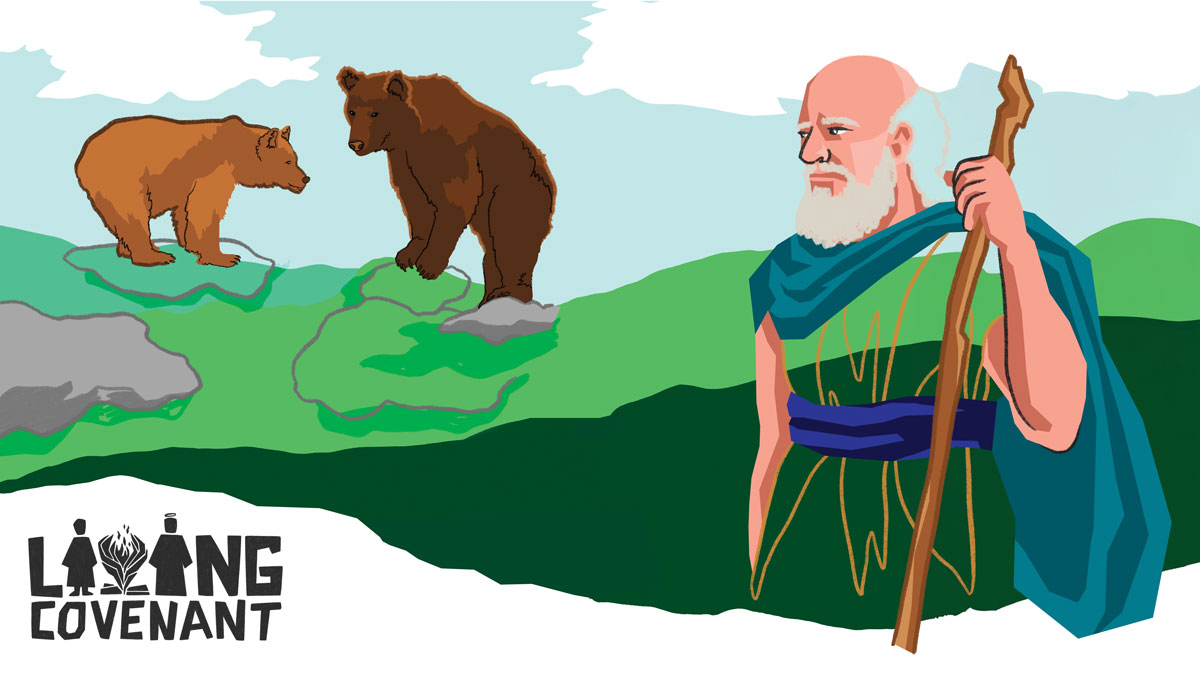Elisha was busy at work, ploughing the family field with oxen, the day his life changed. Without words, the old prophet Elijah approached, and threw his cloak around Elisha in a symbolic gesture that invited him to follow.
What would it take for you to leave everything behind—your job, your studies, your family—in the pursuit of a new direction and calling in your life? That is the question that always bugs me as I read ”The Call of Elisha” in 1 Kings 19:19–21.
As Elisha stands in the middle of his field, he stands at a crossroads in life and purpose. There is every indication that life is good for Elisha. He appears to have a stable job, and the mention of the 12 pairs of oxen indicates that Elisha comes from a wealthy and prosperous family.1 Yet, with one wordless invitation, Elisha responds by slaughtering his yoke of oxen, burning his equipment and setting out to follow Elijah into the unknown.
I was young and in my early teens when I first began to feel the call to ministry. At the time, I would not have been able to tell you what a pastor did all week except “preach the gospel” and “tell people about Jesus”. That is what I wanted to do. As I grew older, the call to ministry continued to nag at me.
Fresh out of high school I became discouraged by my unworthiness and inexperience, and I wondered whether ministry was just a childhood dream as I searched for meaning and purpose in other areas of life. So, I delayed.
Deferring my enrolment to Avondale to pursue a gap year and ”figure things out”, also became a choice to defer my calling. Time eventually dragged on, and I ended up working in a sales role at one of New Zealand’s leading electronics stores. As opportunities for further training and leadership started to come my way, my childhood dream of becoming a pastor slowly slipped into the background.
As Elisha worked tirelessly, sweat dripping from his brow, and going through the motions of everyday life, the jolt of the cloak thrown around him awoke Elisha from his daydream. Turning to look at the old prophet, he was reminded of a forgotten dream of a life of ministry. What else could explain such a radical decision to follow Elijah?
He had only one request for his new master: “Let me kiss my father and mother goodbye, and then I will come with you” (1 Kings 19:20). A request reminiscent of a similar one made by a man in Luke 9, who wished to follow Jesus and become one of His disciples. In that instance, Jesus responded, “No-one who puts a hand to the plough and looks back is fit for service in the kingdom of God” (v62). This challenging statement from Jesus requires a wholehearted commitment to follow Him, leaving no room to return home out of nostalgia. Did Elisha’s longing to return to say goodbye to his family make him unfit for service as a prophet?
Elisha does not look back with a desire to return to his family, but instead “to say goodbye to sever connections and thus be fully available for the mission”.2 His farewell ends with him burning his equipment and a feast of celebration to his new calling, indicating his intention to never return to his former life. When we compare Elisha’s response by destroying his equipment with the response of Jesus’ disciples, who only left their nets and later returned to them (Mark 1:14-20; John 21:1-14), we begin to understand how committed Elisha really was.3 He does not return to say goodbye out of a reluctance to follow, but rather as a symbolic gesture of commitment to his new calling.
At the start of 2013, I had the exciting opportunity to attend the World Changers Youth Congress in Queensland. As a young Kiwi from South New Zealand, I was overwhelmed by the sea of people from across the South Pacific attending the event. One unforgettable night, Pastor Eddie Hypolite preached a sermon on using whatever gifts or talents we had in our hands to serve Jesus. As Pastor Eddie kept repeating the line “What’s in your hand? What’s in your hand?” I looked down at my own hands and was challenged by the thought that although my hands appeared empty and useless to me, if I was willing, God was calling me to use them anyway. I was only one person in a tent full of more than a thousand people, but it felt as though God was speaking directly to me, throwing His cloak around me, and inviting me to follow Him into ministry.
That evening would become a catalyst that awoke me to the forgotten dream of ministry God had called me to so many years earlier. As I returned home to Christchurch, I immediately resigned from the job I loved and reapplied to study ministry and theology. Within only a few weeks, I had moved my entire life to Australia in only two suitcases.
More than 10 years later, I have no regrets about making a decision that would change my life trajectory. Neither do I believe that Elisha would have had any regrets about his commitment to follow His invitation to ministry and never look back.
The life of Elisha exemplifies the kind of character that Jesus is looking for as He invites people to “Come, follow Me.“ Throughout his ministry, Elisha continues to trust in God’s calling on his life, no matter what opposition comes his way. Whether by persevering through the personal attacks and discouragement of others (2 Kings 2:23,24) or by remaining patient and trusting in an army of angels when facing the physical threat of the Arameans (2 Kings 6:8-23), Elisha knew that when God calls, nothing can get in the way of that calling.
This story challenges us to consider the many people who are stuck, going through the motions, with forgotten dreams of a life of service to God in ministry. Consider the person who has waited years to be tapped on the shoulder and given the opportunity to serve. Or the many others, both young and old, who desperately need a role model to help mentor them into the new ministry position God has been calling them to. What about the young women and men, who have ignored the calling God placed on their hearts because they didn’t feel as though they fit the box of what the church was looking for in a pastor? Or worse yet, had been discouraged from pursuing their call.
Only some of us will be called to full-time ministry like Elisha, but all of us are called to a life of ministry. The many fascinating stories of Elisha’s success as a prophet would not have been possible without the ministry of others:
- It was necessary for Elisha to learn from his mentor, Elijah, right up until he was taken to heaven and Elisha was ready to carry on his legacy (2 Kings 2:1-14).
- Whenever Elisha visited Shumen, he relied on the generosity and support of a Shunammite family, who would build him a small room to stay in (2 Kings 4:8-13).
- The miraculous story of Naaman being healed of leprosy would never have happened without the courage of a young servant girl who directed her master to visit Elisha for help (2 Kings 5).
If you have been stuck, going through the motions of everyday life, here is your opportunity to remember the calling God has placed on your heart. A radical decision to pursue a new direction and calling in life may be daunting and difficult, but the possibilities of a life of ministry are endless and rewarding. When the Holy Spirit calls, no matter what obstacles may get in the way, God’s call has a way of finding you.
- Ángel Manuel Rodriguez et al, Andrews Bible Commentary: Old Testament (Berrien Springs, MI: Andrews University Press, 2020), 496.
- Elias Brasil de Souza. “1 Kings.” In 1 Kings–2 Chronicles, vol. 4 of Seventh-day Adventist International Bible Commentary, edited by Jacques B Doukhan et al, (Nampa, ID: Pacific Press) 289-90.
- Iain W Provan, 1 & 2 Kings, of Understanding the Bible Commentary Series, edited by W Ward Gasque et al, (Grand Rapids, MI: Baker Books, 2012), 149–50.
Jonathon Gillard is the associate youth director of the Victorian Conference.






